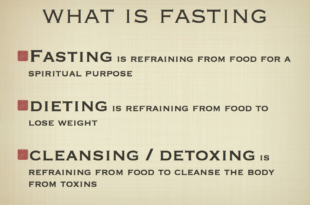
Most importantly, fasting isn’t starvation. Starvation is the automatic restraint from eating constrained upon by outside powers; this occurs in the midst of war and starvation when nourishment is rare. Fasting, then again, is intentional, purposeful, and controlled. Sustenance is promptly accessible however we decide not to eat it because of profound, wellbeing, or different reasons.
Fasting is as old as humanity, far more seasoned than some other types of weight control plans. Old developments, similar to the Greeks, perceived that there was something inherently helpful to occasional fasting. They were frequently called occasions of mending, purging, refinement, or detoxification. For all intents and purposes each culture and religion on earth practice a few ceremonies of fasting.
Prior to the approach of agribusiness, people never ate three dinners per day in addition to nibbling in the middle. We ate just when we discovered sustenance which could be hours or days separated. Henceforth, from a development viewpoint, eating three suppers daily isn’t a necessity for survival. Else, we would not have made due to animal types.
Quick forward to the 21st century, we have all overlooked this antiquated practice. All things considered, fasting is downright awful for business! Sustenance producers urge us to eat different suppers and snacks multi-day. Nourishing specialists caution that skirting a solitary feast will have desperate wellbeing outcomes. Extra minutes, these messages have been so all around penetrated into our heads.
Fasting has no standard length. It might be accomplished for a couple of hours to numerous days to months on end. Irregular fasting is an eating design where we cycle among fasting and customary eating. Shorter fasts of 16-20 hours are by and large accomplished all the more much of the time, even day by day. Longer fasts, ordinarily 24-36 hours, are completed 2-3 times each week. As it occurs, we as a whole quick day by day for a time of 12 hours or so among supper and breakfast.
Fasting has been finished by a huge number of individuals for a large number of years. Is it undesirable? No. Truth be told, various investigations have demonstrated that it has huge medical advantages.
What Happens When We Eat Constantly?
Prior to going into the advantages of discontinuous fasting, it is ideal to comprehend why eating 5-6 suppers per day or at regular intervals (the precise inverse of fasting) may really accomplish more mischief than anything.
When we eat, we ingest nourishment vitality. The key hormone included is insulin (created by the pancreas), which ascends amid suppers. The two starches and protein invigorate insulin. Fat triggers a littler insulin impact, yet fat is once in a while eaten alone.
Insulin has two noteworthy capacities –
To start with, it enables the body to quickly begin utilizing nourishment vitality. Starches are quickly changed over into glucose, raising glucose levels. Insulin guides glucose into the body cells to be utilized as vitality. Proteins are separated into amino acids and overabundance amino acids might be transformed into glucose. Protein does not really raise blood glucose but rather it can animate insulin. Fats have an insignificant impact on insulin.
Second, insulin stores away abundance vitality for sometime later. Insulin changes overabundance glucose into glycogen and stores it in the liver. Be that as it may, there is a breaking point to how much glycogen can be put away. When the farthest point is achieved, the liver begins transforming glucose into fat. The fat is then secured in the liver (in overabundance, it ends up greasy liver) or fat stores in the body (regularly put away as instinctive or midsection fat).
Along these lines, when we eat and nibble for the duration of the day, we are always in a sustained state and insulin levels stay high. At the end of the day, we might spend most of the day putting away sustenance vitality.
What Happens When We Fast?
The way toward utilizing and putting away sustenance vitality that happens when we eat goes backward when we quick. Insulin levels drop, inciting the body to begin consuming put away vitality. Glycogen, the glucose that is put away in the liver, is first gotten to and utilized. From that point onward, the body begins to separate put away muscle to fat ratio for vitality.
In this manner, the body essentially exists in two states – the fed state with high insulin and the fasting state with low insulin. We are either putting away nourishment vitality or we are consuming sustenance vitality. In the event that eating and fasting are adjusted, at that point, there is no weight gain. In the event that we spend most of the day eating and putting away vitality, there is a decent shot that extra time we may finish up putting on weight.
Irregular Fasting Versus Continuous Calorie-Restriction
The bit control procedure of consistent caloric decrease is the most widely recognized dietary proposal for weight reduction and type 2 diabetes. For instance, the American Diabetes Association suggests a 500-750 kcal/day vitality shortfall combined with customary physical movement. Dietitians pursue this methodology and suggest eating 4-6 little dinners for the duration of the day.
Does the segment control system work over the long haul? Seldom. An associate report with a 9-year follow-up from the United Kingdom on 176,495 stout people demonstrated that just 3,528 of them prevailing with regards to achieving ordinary body load before the finish of the investigation. That is a disappointment rate of 98%!
Discontinuous fasting isn’t a consistent caloric limitation. Confining calories causes a compensatory increment in yearning and more regrettable, an abatement in the body’s metabolic rate, a twofold revile! Since when we are consuming fewer calories every day, it turns out to be progressively harder to get more fit and a lot less demanding to restore load after we have lost it. This kind of eating regimen puts the body into a “starvation mode” as digestion revs down to moderate vitality.
Irregular fasting does not have any of these disadvantages.
Medical advantages Of Intermittent Fasting
Builds digestion prompting weight and muscle to fat ratio misfortune
Not at all like an every day caloric decrease diet, discontinuous fasting raises digestion. This bodes well from a survival viewpoint. On the off chance that we don’t eat, the body utilizes put away vitality as fuel with the goal that we can remain alive to discover another supper. Hormones enable the body to change vitality sources from nourishment to muscle to fat ratio.
Studies exhibit this wonder plainly. For instance, four days of persistent fasting expanded Basal Metabolic Rate by 12%. Dimensions of the synapse norepinephrine, which readies the body for activity, expanded by 117%. Unsaturated fats in the circulation system expanded over 370% as the body changed from consuming sustenance to consuming put away fats.
No misfortune in bulk
Not at all like a consistent calorie-limitation diet, discontinuous fasting does not copy muscles the same number of having dreaded. In 2010, specialists took a gander at a gathering of subjects who experienced 70 days of exchange day by day fasting (ate one day and fasted the following). Their bulk began off at 52.0 kg and finished at 51.9 kg. As it were, there was no loss of muscles however they lost 11.4% of fat and saw significant enhancements in LDL cholesterol and triglyceride levels.
Amid fasting, the body normally delivers increasingly human development hormone to save fit muscles and bones. Bulk is commonly saved until muscle to fat ratio dips under 4%. Along these lines, a great many people are not in danger of muscle-squandering while doing discontinuous fasting.
Turns around insulin obstruction, type 2 diabetes, and greasy liver
Type 2 diabetes is a condition whereby there is essentially a lot of sugar in the body, to the point that the cells can never again react to insulin and take in any more glucose from the blood (insulin obstruction), bringing about high glucose. Likewise, the liver ends up stacked with fat as it endeavors to get out the overabundance glucose by changing over it too and putting away it as fat.
Subsequently, to turn around this condition, two things need to occur –
To start with, quit putting more sugar into the body.
Second, consume the rest of the sugar off.
The best eating regimen to accomplish this is a low-sugar, moderate-protein, and high-sound fat eating routine, likewise called a ketogentic diet. (Keep in mind that starch raises glucose the most, protein somewhat, and fat the least.) That is the reason a low-carb diet will help decrease the weight of approaching glucose. For a few people, this is as of now enough to turn around insulin opposition and type 2 diabetes. Notwithstanding, in increasingly serious cases, diet alone isn’t adequate.
Shouldn’t something be said about exercise? Exercise will help consume off glucose in the skeletal muscles yet not every one of the tissues and organs, including the greasy liver. Obviously, practice is essential, yet to wipe out the abundance glucose in the organs, there is the need to briefly “starve” the cells.
Irregular fasting can achieve this. That is the reason generally, individuals considered fasting a scrub or a detox. It very well may be an extremely integral asset to dispose of the considerable number of overabundances. It is the quickest method to bring down blood glucose and insulin levels, and in the long run turning around insulin obstruction, type 2 diabetes, and greasy liver.
Coincidentally, taking insulin for sort 2 diabetes does not address the main driver of the issue, which is overabundance sugar in the body. The facts confirm that insulin will push the glucose far from the blood, bringing about lower blood glucose, yet where does the sugar go? The liver is simply going to transform everything into fat, fat in the liver and fat in the belly. Patients who go on insulin regularly end up putting on more weight, which declines their diabetes.
Upgrades heart wellbeing
Additional time, high blood glucose from sort 2 diabetes can harm the veins and nerves that control the heart. The more one has diabetes, the higher the odds that coronary illness will create. By bringing down glucose through discontinuous fasting, the danger of cardiovascular sickness and stroke is additionally decreased.
Likewise, discontinuous fasting has been appeared to improve circulatory strain, aggregate, and LDL (awful) cholesterol, blood triglycerides, and incendiary markers related to numerous endless maladies.
Lifts intellectual competence
Different examinations exhibited fasting has numerous neurologic advantages including consideration and center, response time, quick memory, discernment, and age of new mind cells. Mice consider additionally demonstrated that discontinuous fasting diminishes mind aggravation and keeps the side effects of Alzheimer’s.
What’s in store With Intermittent Fasting
Craving Goes Down
We ordinarily feel cravings for food around four hours after dinner. So on the off chance that we quick for 24 hours, does it imply that our yearning sensations will be multiple times increasingly extreme? Obviously not.
Numerous individuals are worried that fasting will result in outrageous craving and indulging. Studies demonstrated that on the after a long time following a one-day quick, there is, without a doubt, a 20% expansion in caloric admission. Be that as it may, with continued fasting, craving and hunger shockingly decline.
Yearning comes in waves. On the off chance that we don’t do anything, the appetite disseminates sooner or later. Drinking tea (numerous types) or espresso (with or without caffeine) is frequently enough to fend it off. In any case, it is ideal to drink it dark however a teaspoon or two of cream or creamer won’t trigger much insulin reaction. Try not to utilize any sorts of sugar or counterfeit sugars. On the off chance that vital, bone stock can likewise be taken amid fasting.
Glucose does not crash
At times individuals stress that glucose will fall low amid fasting and they will end up insecure and sweat-soaked. This does not really occur as glucose is firmly checked by the body and there are different systems to keep it in the best possible range. Amid fasting, the body starts to separate glycogen in the liver to discharge glucose. This happens each night amid our rest.
 1 Healthy Eating Your No.1 Healthy Blog
1 Healthy Eating Your No.1 Healthy Blog



